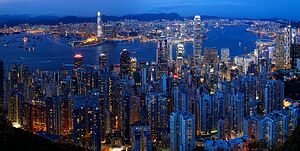For the fourth time since the 1997 return of Hong Kong to China, legal professionals staged a silent protest against intervention by Beijing. Over 2,000 legal professionals dressed in black marched through Hong Kong’s central business district in silence on Tuesday.
The march was in response to the National People’s Congress Standing Committee’s interpretation of Basic Law Article 104, which held that lawmakers must be “sincere” and read the prescribed oath “completely, accurately and solemnly” in order to assume their posts.
The interpretation came after Sixtus “Baggio” Leung, 30, and Yau Wai-ching, 25 – who were democratically elected to Hong Kong’s legislative council in early September – used the swearing-in ceremony to demonstrate against China, and slandered Chinese people with a derogatory term from the World War II era.
China reacted harshly to the two legislator’s actions, calling Leung and Yau “national and ethnic traitors” before announcing Beijing’s interpretation of Article 104. While the majority of Hong Kong citizens disapproved of the two firebrands’ actions, many have seen this most recent intervention by China as an overreach of power, and detrimental to the “one country, two systems” concept.
The Progressive Lawyers Group says the ruling has gone well beyond an interpretation of the Basic Law as it effectively prescribes matters within the remit of Hong Kong domestic law, which is a power not accorded to Beijing under the existing Basic Law framework of Hong Kong.
Leading the march were senior counsels including Martin Lee Chu-ming, Audrey Eu Yuet-mee, Graham Harris, Alan Leong Kah-kit, and solicitor John Clancey. Denis Chang, second on the Bar list, was also there.
Alvin Yeung, a lawmaker representing the Civic Party, told HKFP that the legal profession was here today “to express our concerns, our deep condemnation, and deep regret regarding the interpretation of the Basic Law.”
Barrister and lawmaker Tanya Chan of the Civic Party said the march was a very strong statement made by the legal profession as well as members of the public.
“This is a very serious matter… Before the interpretation of Article 104, the secretary for justice and legislators of the pro-Beijing camp insisted that the judicial system could solve this legal issue. However, the Standing Committee initiated the whole thing — the whole interpretation procedure… This is not simply an interpretation but actually a rewriting of Hong Kong law — this is totally unacceptable. We have clear procedures illustrating how the law can be amended,” said Chan.
Martin Lee Chu-ming, a member of the Basic Law Drafting Committee in the 1980s, led the procession and said that Beijing had no legal right to do change Hong Kong laws.
“It is like a tank crashing into Hong Kong’s legal system,” said Lee. “It is not an interpretation of the Basic Law – it is an amendment of Hong Kong law.”
Incumbent Chief Executive CY Leung has insisted on the expulsion of Yau and Leung from the Legislative Council. However a Basic Law adviser to Beijing said it was up to local courts to decide whether the new mainland ruling would apply retrospectively. This offers a glimmer of hope for the two young legislators-elect, but also the possibility of legal challenges against other pan-democrat lawmakers over the way oaths were taken.
In 2014, the legal profession also initiated a silent march after Beijing issued a white paper which said that judges should be patriotic.

































